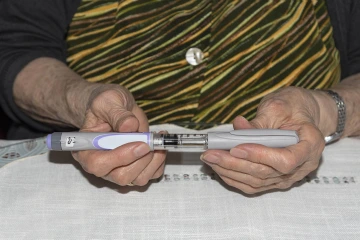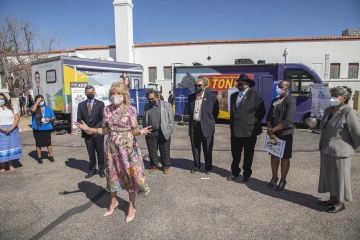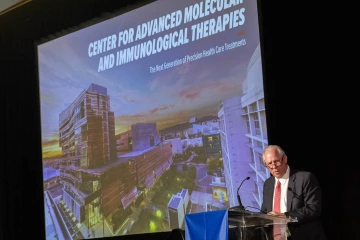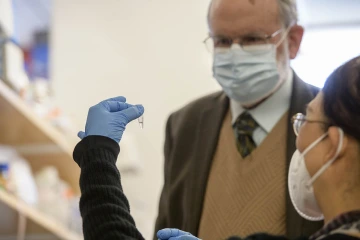CAMI, Cancer and Aging: UArizona Health Sciences’ Top Stories of 2022
The Center for Advanced Molecular and Immunological Therapies, impactful research studies and a visit from first lady Jill Biden made headlines at the University of Arizona Health Sciences in 2022.

The Center for Advanced Molecular and Immunological Therapies garnered strong state and private philanthropic support in 2022.
The University of Arizona Health Sciences announced a new Phoenix-based center, reported on significant research in the areas of cancer, aging and neurodegenerative diseases, and celebrated the approval of new degree programs to expand the health care workforce in 2022.
From investigating and solving critical health care problems to training the next generation of health professionals, UArizona Health Sciences researchers, physician-scientists, staff and students continued to work tirelessly to create healthier communities for all.
Here are the top UArizona Health Sciences news releases of 2022:
Phoenix to be Site of New UArizona Health Sciences Center Targeting Immunotherapies

Researchers and physician-scientists are increasingly using precision medicine to develop new cell- and gene-based therapeutical options for diseases, building on the idea that the most effective defense against health issues is the body’s natural immune system. CAMI will be a hub to advance knowledge of the immunology of cancers, infectious diseases and autoimmune conditions to develop novel strategies for the diagnosis, prevention and treatment of diseases.
New Study Identifies Connection Between Diabetes Medications, Multiple Sclerosis

“Our findings reinforce the need for a precision medicine approach to preventing MS in these vulnerable populations,” said lead researcher Kathleen Rodgers, PhD, associate director of translational neuroscience in the Center for Innovation in Brain Science at UArizona Health Sciences and BIO5 Institute member.
Menopause and Cognition: Testing an Alternative to Estrogen Therapy

A $7.6 million grant from the National Institutes of Health is funding a clinical trial to allow researchers in the Center for Innovation in Brain Science to test a plant-based alternative to hormone therapy that may have the potential to reduce symptoms of menopause and risk of Alzheimer’s disease in women.
“Our research has shown that the greater risk for Alzheimer’s in women is not because they live longer than men, but because the disease can start earlier in women, at midlife during their menopausal transition,” said Regents Professor Roberta Diaz Brinton, PhD, director of the Center for Innovation in Brain Science at UArizona Health Sciences and BIO5 Institute member.
UArizona Cancer Center Members Available to Speak About Cancer Moonshot Initiative

The University of Arizona Cancer Center partnered with the Tohono O’odham Nation to welcome First lady Jill Biden, EdD, to Tucson, Arizona, on March 8. First lady Biden and Xavier Becerra, Secretary of the U.S. Department of Health and Human Services, visited the San Xavier Health Center in the San Xavier District of the Tohono O’odham Nation to highlight the work being done in the National Cancer Institute’s Cancer Moonshot initiative. In 2020, the UArizona Cancer Center received a $3 million, three-year award from the Cancer Moonshot initiative to increase colorectal cancer screening in Arizona’s American Indian communities.
“The University of Arizona Cancer Center is so pleased that the Biden Administration has reignited the Cancer Moonshot,” said Joann Sweasy, PhD, director of the UArizona Cancer Center, Nancy C. and Craig M. Berge Endowed Chair and BIO5 Institute member. “Funding for this initiative is essential to prevent and cure cancer.”
New UArizona Health Sciences Center Receives $150M State Investment Plus Philanthropic Support

CAMI received a strong vote of support from Arizona Gov. Doug Ducey, who designated $150 million in new funding for the Phoenix-based center. At the same time, CAMI received its first private philanthropic support as part of a new $10 million gift from the Steele Foundation. Of the gift, $2 million is designated for CAMI, to be located at the Phoenix Bioscience Core in downtown Phoenix.
"There is not a field with more explosive growth than immunotherapy. We are seeing rapid growth in research investments and increased formation of academic and industry partnerships around the world," said Michael D. Dake, MD, senior vice president for UArizona Health Sciences. "CAMI will open new doors of discovery and advance precision medicine to improve health and human potential for people across Arizona and around the world. We are incredibly grateful to Gov. Ducey and the Steele Foundation for supporting that vision by investing in what will be a transformational center for Phoenix and the state of Arizona and its residents."
Health Professions Degree Programs to Expand Workforce in Critical Areas

UArizona Health Sciences received approval from the Arizona Board of Regents to launch three new degree programs aimed at addressing ongoing health care workforce shortages in the health fields of physical therapy, physician assistant and nurse-midwifery.
Each of these new health programs will create an expanded pipeline of skilled professionals to provide greater access to care for patients in Arizona’s diverse rural and urban communities. All three programs are independently seeking accreditation before they will be available for student enrollment.

Robert C. Robbins, MD, president of the University of Arizona, and Kayse Shrum, DO, president of Oklahoma State University, announced the two institutions’ academic medical centers have joined forces to combat the opioid crisis and chronic pain through research, treatment and education.
The partnership will share institutional resources from three research centers – the UArizona Health Sciences Comprehensive Pain and Addiction Center, the National Institute on Drug Abuse-funded Center for Excellence in Addiction Studies at UArizona Health Sciences, and the OSU Center for Health Sciences’ National Center for Wellness & Recovery – to advance pain and addiction research and accelerate positive health outcomes in Arizona, Oklahoma and across the country.
Is it Possible to Slow the Progression of Muscle Degeneration in ALS Patients?

A $1.5 million grant from the U.S. Department of Defense is supporting researchers in the UArizona Health Sciences Center for Innovation in Brain Science as they examine whether an investigational drug has the potential to reduce inflammation and increase the regeneration of nerve cells in people with Lou Gehrig’s disease, or ALS.
ALS is a progressive neurological disease that causes nerve cells, or neurons, in the brain and spinal cord to stop working and die. As neurons lose the ability to trigger specific muscles, muscles weaken and can become paralyzed. People who have ALS, or amyotrophic lateral sclerosis, may lose the ability to speak, eat, move and breathe.
Valley Fever Collaborative Awarded $3.3M in Research Funds

The Valley Fever Collaborative, a UArizona Health Sciences-led partnership with Arizona State University and Northern Arizona University, was awarded $3.3 million in Regents’ Grant funding by the Arizona Board of Regents to start an integrated, statewide research project to identify, characterize and map hotspots and routes of exposure for Valley fever.
“We know Arizona is responsible for two-thirds of all U.S. Valley fever infections, but just looking across the land we can’t tell which places the fungus grows or are the source of so many infections,” said John Galgiani, MD, director of the Valley Fever Center for Excellence in the UArizona College of Medicine – Tucson and member of the BIO5 Institute. “This study will try to connect the dots between strains that cause people to get sick, where in the land they come from and what it is about those hot spots that makes the fungus thrive. With this new information, we might prevent infections at work sites or even for everyone who lives here.”
Study Aims to Reduce Firefighter Cancer Risk

A new study by researchers from UArizona Health Sciences and Arizona State University in collaboration with fire service research partners will examine ways to potentially reduce the risk of cancer and cardiovascular disease among firefighters, thanks to a $4 million Regents’ Research Grant from the Arizona Board of Regents. Researchers will test the effectiveness of blood or plasma donations in lowering levels of cancer-causing “forever chemicals” – per- and polyfluoroalkyl substances, or PFAS – and whether lower levels of PFAS reduce the risk of cancer or cardiovascular disease.
“These research questions came directly from the fire service, specifically to look at ways of preventing cancer and cardiovascular disease among firefighters,” said Jeff Burgess, MD, MS, MPH, professor in the Mel and Enid Zuckerman College of Public Health, BIO5 Institute member and director of the new Center for Firefighter Health Collaborative Research at the Zuckerman College of Public Health, where the research will take place.
Contact
Stacy Pigott
Health Sciences Office of Communications
520-539-4152
spigott@arizona.edu

